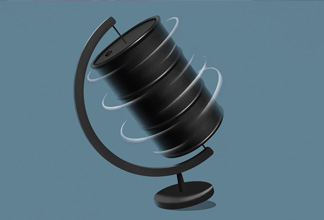Pop Quiz: What Are You Saving For?
Written by Rita Silvan
Published on May 5, 2021
minute read
Share:
Confession: I am not a natural saver. In my 30s, I knew I had to change my money habits, but platitudes like "it's important to save" did little to motive me. Like many people, for too long, I tended to approach saving money as a series of tasks to cross off a to-do list — not the most winning approach. As financial therapist Amanda Clayman puts it, “Money is the dragon, and we're trying to hold on to its tail as it whips us around."
While we all know saving is important, sometimes the goal is a bit hazy. A "good retirement," for example, means different things to different people. (One person's rustic cabin by the lake is another's pied-à-terre in Rome — each comes with different funding requirements, not to mention wardrobes.) Because saving always implies putting off sure and immediate gratification today for the possibility of something bigger and better in a distant and uncertain future, it's important to get clear on what "bigger and better" means to us. This is where our values come in. Instead of feeling whipsawed by competing financial demands (that is, letting that money dragon throw us this way and that), Clayman recommends being proactive and having a sense of purpose.
"Our personal values shape our ideas of what we should and shouldn't do with money," says Clayman. "Unpacking true values is about reflection. One of the things that's often missing in a healthy relationship with money is to sit back and ask, 'How do I feel about this?' Or 'What do I wish there was more of and also less of in my financial life?' Only in answering questions like this can we get to a place of clarity with what our values are." (Find more questions to ask yourself today in the "How to Save with Purpose" sidebar below.)
Purposeful saving also helps us stick with the plan, especially when temptation strikes. Financial decisions are challenging because we have to balance different potential scenarios and consequences. “When we're under the sway of hunger, fatigue or an adrenalin rush, a lot of mistakes tend to happen," Clayman says. "When we are sitting down and thinking about where we want our money to go, and what we want it to do for us, our brain has the space and resources it needs to make good decisions."
Importantly, plan as you might, mistakes will happen, says Clayman. "We could make a very good decision that is fully informed and comes from a place of clarity and purpose, but because of other reasons — and we saw this a lot during the pandemic — there's still a bad outcome," she says. "That doesn't mean the decision itself was bad. Financial mistakes are part of the process and should not engender feelings of shame."
Clayman has observed that COVID-19 has shaken up a lot of legacy choices around money. Among her clients, she sees a greater sense of how precious and finite life is, and a renewed focus on doing what is important to them. "The centrality of our values has really risen because of COVID," she says.
Values shift over time. Purposeful saving in our 20s and 30s will be different in our 50s and 60s. Clayman recalls how when she became a parent for the first time she spent "a stupid amount of money on strollers… If you've never been a parent before, new values will emerge or existing values will shift. We're always on a learning curve." (For more kid-related costs you might not see coming, check out Kids Are So Expensive — But Not In the Way I Expected.)
I'm happy to report that, thanks to purposeful saving, I no longer let the money dragon whip me about. As is true for many people, one of my values is financial independence. For me, this includes a "work optional" lifestyle with a high level of professional autonomy. I concretized that value by painting the picture — for instance, being able to take my dog for a long walk on a beautiful day without looking at my watch — and by establishing the savings amount needed to actualize it. The shift to focusing on my values has made saving (and investing) a pleasure instead of a burden. So, yes, saving is important, but saving to support your personal values is also, dare I say, fun.
|
How to Save with Purpose: 8 Questions from Amanda Clayman Looking to save with purpose? Start to discover your money values by asking yourself these questions today:
|
*Embrace the subjectivity, and focus on how you feel, rather than how you think you should feel, says Clayman.
RBC Direct Investing Inc. and Royal Bank of Canada are separate corporate entities which are affiliated. RBC Direct Investing Inc. is a wholly owned subsidiary of Royal Bank of Canada and is a Member of the Investment Industry Regulatory Organization of Canada and the Canadian Investor Protection Fund. Royal Bank of Canada and certain of its issuers are related to RBC Direct Investing Inc. RBC Direct Investing Inc. does not provide investment advice or recommendations regarding the purchase or sale of any securities. Investors are responsible for their own investment decisions. RBC Direct Investing is a business name used by RBC Direct Investing Inc. ® / ™ Trademark(s) of Royal Bank of Canada. RBC and Royal Bank are registered trademarks of Royal Bank of Canada. Used under licence.
© Royal Bank of Canada 2021.
The views and opinions expressed in this publication are for your general interest and do not necessarily reflect the views and opinions of RBC Direct Investing. Furthermore, the products, services and securities referred to in this publication are only available in Canada and other jurisdictions where they may be legally offered for sale. If you are not currently resident of Canada, you should not access the information available on the RBC Direct Investing website.
Explore More

The Hidden Costs of Being Single
How single Canadians can build wealth on their own terms
minute read

What Investors Can Learn from Hockey Star and RBC Olympian Sarah Nurse
Nurse's path to the podium reveals how preparation, planning and practice can turn potential into a golden opportunity
minute read

Crude Questions? A Look at Canada’s Oil Economy
What you need to know about Canada’s oil industry
minute read
Inspired Investor brings you personal stories, timely information and expert insights to empower your investment decisions. Visit About Us to find out more.







